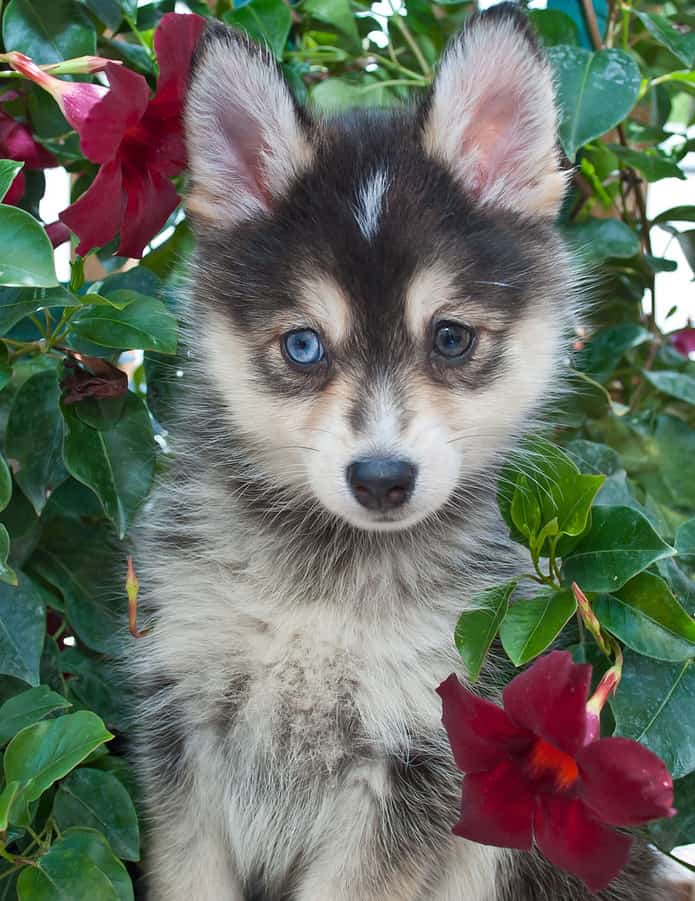| Country of origin: | United States |
| Registries: | ARBA, IPA, DRA, ACHC |
| Breed Group: | Not officially recognized by major kennel clubs |
| Occupation: | Companion, family pet |
| Size: | 15–35 lb (7–16 kg), 10–15 in (25–38 cm) |
| Lifespan: | 12 to 15 years |
| Exercise: | Moderate daily exercise |
| Training: | Moderate difficulty; can be stubborn |
| Grooming: | Regular brushing, moderate shedding |
| Colors: | Various colors and patterns |
Pomsky Breed Overview
The Pomsky is a designer dog breed that has gained popularity in recent years due to its charming appearance and endearing personality. This breed is a cross between the Pomeranian and the Siberian Husky, combining the best of both breeds. With their soft, thick coats, bright eyes, and playful demeanor, the Pomsky has captured the hearts of many dog lovers worldwide.
Pomsky Breed History
The Pomsky is a relatively new breed, originating in the early 21st century. Breeders aimed to create a dog that showcased the best qualities of the Pomeranian and Siberian Husky, resulting in a small to medium-sized dog with the appearance of a miniature Husky. The breed gained popularity quickly, particularly on social media, where their adorable looks and entertaining antics captured the attention of dog enthusiasts everywhere. Despite their recent origin, the Pomsky has already established a devoted following and continues to grow in popularity.
Pomsky Breed Size
As a crossbreed, the Pomsky’s size can vary, depending on the size of the parent breeds. However, they generally fall within the following ranges:
- Height (male and female): 10-15 inches (25-38 cm)
- Weight (male): 15-25 pounds (7-11 kg)
- Weight (female): 10-20 pounds (5-9 kg)
The Pomsky is a small to medium-sized breed, making them suitable for a variety of living situations, including apartments and homes with limited space. However, they still require regular exercise to maintain their health and happiness.
Pomsky Breed Temperament
Pomskies are known for their friendly and affectionate nature, making them excellent companions and family pets. They are intelligent, energetic, and playful, with a strong desire to please their owners. The Pomsky’s temperament is influenced by both the Pomeranian and Siberian Husky, resulting in a mix of loyalty, independence, and playfulness. They can be somewhat stubborn at times, but with proper training and socialization, they can become well-mannered and adaptable dogs.
Common Health Issues in Pomskies
While Pomskies are generally healthy dogs, they can be predisposed to certain health issues common to their parent breeds. Some of the most common health concerns for this breed include:
- Patellar Luxation
- Hip Dysplasia
- Eye Problems (such as Progressive Retinal Atrophy)
- Dental Issues
- Allergies
Regular veterinary check-ups, proper diet, and exercise can help manage these issues and ensure the overall health and well-being of your Pomsky.
Grooming Needs for Pomskies
The Pomsky’s thick, double coat requires regular grooming to keep it clean, healthy, and free from tangles. A grooming plan for a Pomsky should include:
- Brushing at least 2-3 times a week
- Bathing every 4-6 weeks, or as needed
- Regular nail trimming
- Teeth brushing and dental care
- Ear cleaning and checking for signs of infection
Pomsky Breed Diet
A balanced and nutritious diet is essential for maintaining the health and well-being of your Pomsky. Some example foods to include in their diet are:
- High-quality dry kibble, specifically formulated for small or medium-sized breeds
- Lean protein sources, such as chicken, turkey, or fish
- Fruits and vegetables, such as blueberries, carrots, and peas
- Healthy fats, like fish oil or flaxseed oil, for skin and coat health
It’s essential to consult with your veterinarian to determine the appropriate portion sizes and feeding schedule for your Pomsky, as their nutritional needs may vary based on their age, size, and activity level.
Exercise Requirements for Pomskies
Pomskies are energetic and playful dogs that require regular exercise to stay healthy and happy. Some example exercises for your Pomsky include:
- Daily walks
- Fetch and other interactive games
- Agility training or other dog sports
- Puzzle toys and treat-dispensing toys for mental stimulation
It’s important to ensure your Pomsky gets enough physical activity and mental stimulation to prevent boredom, which can lead to destructive behaviors or other behavioral issues.
Training Tips for Pomskies
Training your Pomsky should begin as early as possible, with a focus on positive reinforcement and consistency. Since Pomskies can be stubborn at times, patience and persistence are key to successful training. Socialization is also essential, exposing your Pomsky to various people, animals, and environments to help them become well-adjusted and confident adults.
Living Conditions for Pomskies
Pomskies can adapt to a wide range of living situations, from apartments to larger homes. However, they may not be suitable for those with allergies or those who cannot commit to regular grooming and exercise. The Pomsky’s energetic and playful nature may not be ideal for households with very young children or seniors, as their exuberance could unintentionally cause injury. As a social breed, they thrive in environments where they can be with their family and receive regular attention and interaction.
Socialization for Pomskies
Proper socialization is crucial for the Pomsky breed, helping to ensure they grow up to be well-adjusted, confident, and friendly dogs. Exposing your Pomsky to various people, animals, and environments from a young age can help them become more comfortable in different situations and reduce the likelihood of fear or aggression. Regular visits to dog parks, puppy playdates, and obedience classes can all provide valuable socialization opportunities for your Pomsky.
The Endearing and Adaptable Pomsky
In conclusion, the Pomsky is a charming and adaptable breed that makes an excellent companion for a variety of households. With their playful and affectionate nature, they quickly become beloved family members. By providing proper care, training, and socialization, you can ensure your Pomsky leads a happy, healthy, and fulfilling life.
